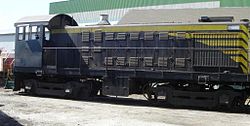ALCO S-2

Grafton and Upton Railroad #1001, an S-4, rests in Hopedale, MA on May 11, 2008
|
|||||||||||||||||||||||||||||||||||||||||||
|
|||||||||||||||||||||||||||||||||||||||||||
|
|||||||||||||||||||||||||||||||||||||||||||
|
|||||||||||||||||||||||||||||||||||||||||||
|
|||||||||||||||||||||||||||||||||||||||||||
| Type and origin | |
|---|---|
| Power type | Diesel-electric |
| Builder | ALCO and MLW |
| Model | S-2 and S-4 |
| Build date | S-2: August 1940 – June 1950 S-4: June 1949 – August 1957 |
| Total produced | S-2: 1502, S-4: 797 |
| Specifications | |
|---|---|
| Configuration: |
|
| • AAR | B-B |
| Gauge | 4 ft 8 1⁄2 in (1,435 mm) standard gauge |
| Trucks | S-2: Blunt S-4: AAR type A |
| Wheel diameter | 40 in (1,016 mm) |
| Minimum curve | 50° or 118.31 ft (36.06 m) |
| Wheelbase | 30 ft 6 in (9.30 m) |
| Length | 46 ft (14.02 m) |
| Width | 10 ft 2 1⁄2 in (3.11 m) |
| Height | 14 ft 6 in (4.42 m) |
| Loco weight | 230,000 lb (100,000 kg) |
| Fuel capacity | 635 US gal (2,400 L; 529 imp gal) |
| Prime mover | Alco 539T |
| Engine type | Inline 6 Four-stroke diesel |
| Aspiration | Turbocharged |
| Displacement | 1,595 cu in (26.14 L) per cylinder 9,572 cu in (156.86 L) total |
| Generator | GE GT 553-A |
| Traction motors | (4) GE 731 |
| Cylinders | 6 |
| Cylinder size | 12 1⁄2 in × 13 in (318 mm × 330 mm) |
| Performance figures | |
|---|---|
| Power output | 1,000 hp (746 kW) @ 740 rpm |
| Tractive effort | 57,500 lb (26,100 kg) |
| Career | |
|---|---|
| Locale | United States, Canada, Mexico, Australia |
The ALCO S2 and S4 were 1,000 horsepower (746 kW) diesel electric switchers produced by ALCO and Canadian licensee Montreal Locomotive Works (MLW). Basically, the two locomotives differed only in trucks, with the S-2 using ALCO's own "Blunt" trucks, and the S-4 riding on standard AAR type A switcher trucks. Both were powered by ALCO 539 turbocharged, 6-cylinder diesels. The S-2 was built between August 1940 and June 1950, with a total of 1502 completed, while the S-4 was constructed between June 1949 and August 1957 (MLW until 1957) with total sales of 797. Canadian production of the S-4 started more than a year before U S production of the S-4. ALCO did not start building the S-4 until August 1950. A modified version, the S-7, was built by MLW only; 29 were built between June and August 1957.
The exterior of the locomotives were styled by an Alco engineer, Ray Patten, using curves in a mild application of Art Deco principles.
The S-2 and S-4 are distinguishable externally from the very similar S-1 and S-3 660 hp (492 kW) switchers in that they have a larger exhaust stack with an oblong base and a larger radiator shutter area on the nose sides. The S-1/S-3 radiator shutter area is taller than it is wide, while the S-2/S-4 radiator area is wider. The larger stack is due to turbocharging. The carbody and cab of late S-2s are nearly indistinguishable from those of S-4s. Hence, a truck swap can cause many to misidentify a unit.
A few S4s are still in service on shortline railroads around the United States. Several more are preserved in US and Canadian railroad museums.
An S-2, of D&RGW heritage, survives on the Big South Fork Scenic Railway, as number 102. It was purchased in 1963 for the Kentucky and Tennessee Railway, and is in operable condition in Stearns, Kentucky.
SP1474 is in operation, in rotation, at the Orange Empire Railway Museum in Perris, CA, pulling a tourist train on weekends.
...
Wikipedia
